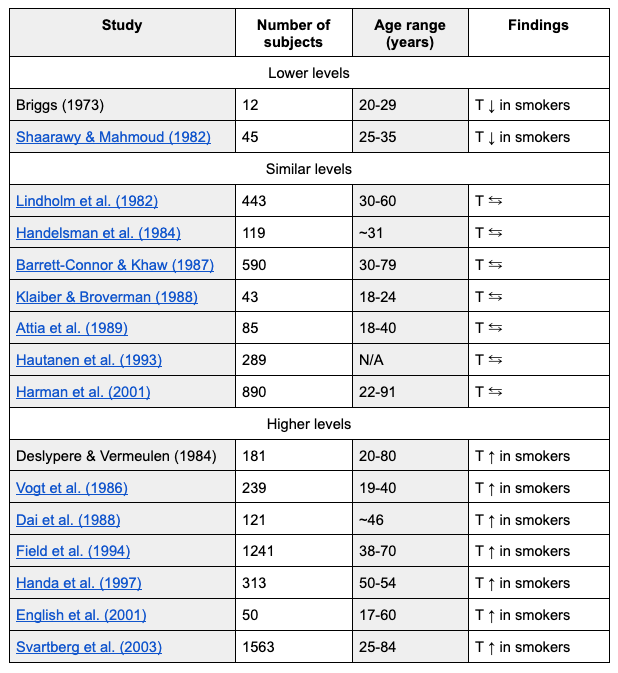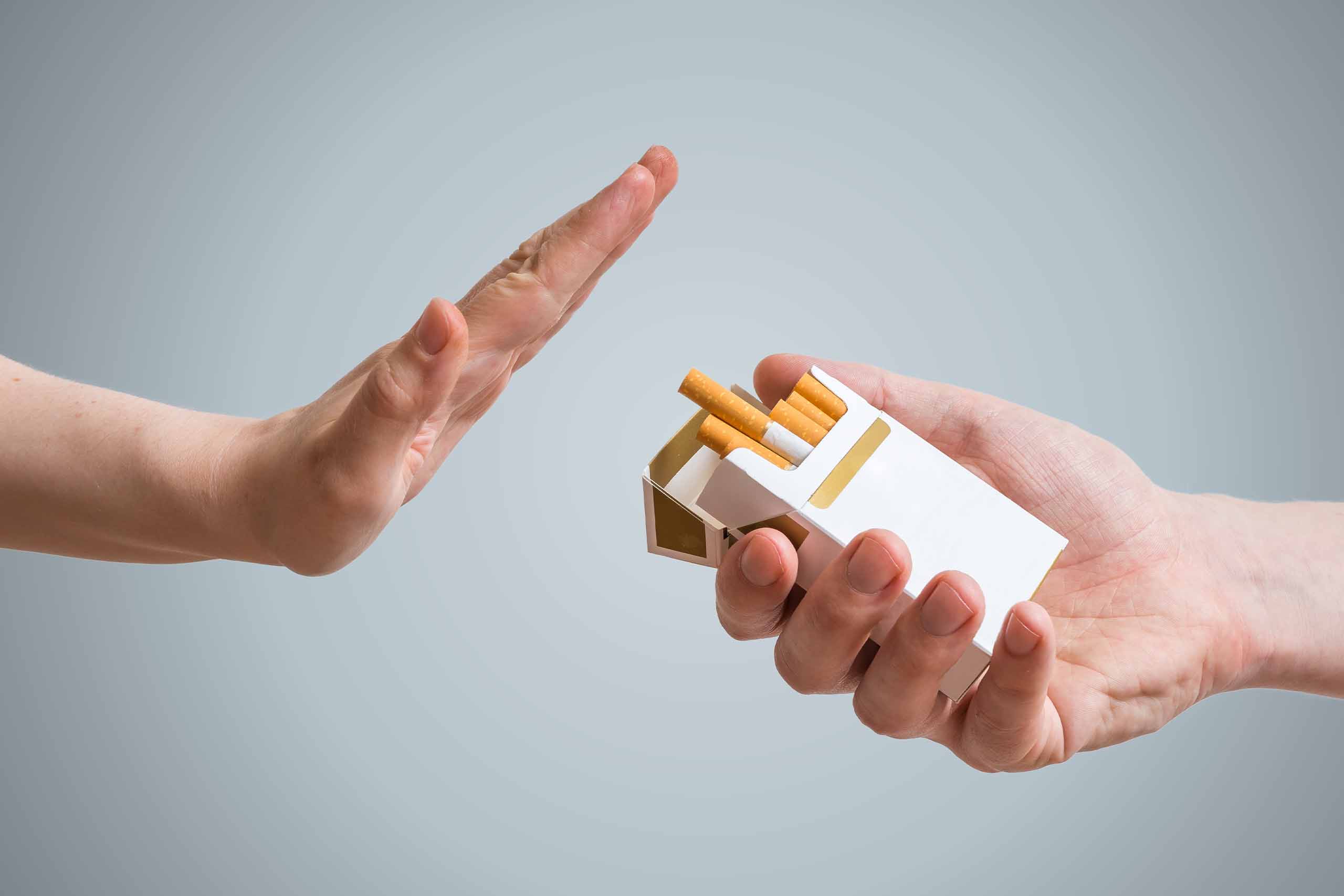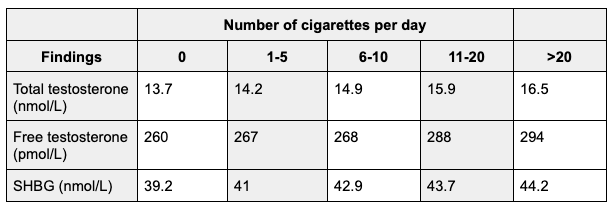Does Smoking Lower Testosterone Levels?
Smoking is a significant health problem associated with various diseases. According to the CDC, cigarette smoking is the cause of around 480,000 deaths annually in the United States. Furthermore, smoking-related diseases affect more than 16 million Americans.
However, research suggests that smoking may contradict popular belief regarding its effects on men’s testosterone levels. The habit generally thought to be “bad” for men’s reproductive health may instead increase testosterone levels.
Is this true? Or is this another misconception? Read on to find out.
RELATED: Why Is There a Steady Decrease in Testosterone Levels of Men in the U.S.?

What You Don’t Know About Smoking and Testosterone Levels
How Does Smoking Affect Testosterone?
Smoking May Increase Testosterone
According to the International Journal of Andrology, there is a positive correlation between smoking status and testosterone levels in over 3,000 men. Compared to men who never smoked, smokers had 15% higher total and 13% higher free testosterone levels.
Even more surprisingly, increasing the number of cigarettes per day can simultaneously increase both total and free testosterone levels, meaning the more cigarettes smoked, the higher the effect on testosterone.
The Effects Remain Inconclusive
However, the reported effects of smoking on testosterone levels remain primarily conflicting. For example, many studies found that smoking may lower or cause no change in the male hormone, whereas many other studies claim otherwise.
Below are the studies investigating the effects of cigarette smoking on testosterone levels:

According to the findings above:
- 2 studies found decreased testosterone levels caused by smoking
- 7 studies found no difference in testosterone levels between smokers and non-smokers
- 7 studies found increased testosterone levels in smokers
Comparing Testosterone Levels in Smokers, Previous Smokers, and Never-smokers
So, if cigarette smoking does increase testosterone levels, how much testosterone does smoking increase in smokers?
To put it into perspective, the International Journal of Andrology research compared testosterone levels in smokers who had smoked for an average of 42.8 years, 11.6 cigarettes per day, to previous and never-smokers.

These findings indicate that between never-smokers and previous smokers, testosterone levels are comparable in both total and free parameters.
However, testosterone levels in smokers who smoke an average of 11.6 cigarettes per day for 42.8 years have, surprisingly, much higher testosterone levels. Accordingly, these smokers have over 10% higher levels of total testosterone while having 20% higher levels of free testosterone than previous smokers and 10% than never-smokers.

How Does Smoking Increase Testosterone?
Smoking and the SHBG Level
Sex hormone-binding globulin (SHBG) is a protein that influences the bioavailability of testosterone. The amount of testosterone in your circulation is regulated by SHBG, which controls which tissues this hormone can access. Therefore, SHBG is crucial in transporting sex hormones’ active forms all over your body, hence known as the “carrier” of testosterone.
The International Journal of Andrology research found that smoking was positively associated with the SHBG level. However, smoking does not affect bioavailable testosterone, although SHBG levels are higher in smokers. This suggests that the rise in total testosterone levels may have been a byproduct of the elevated SHBG levels.
Smoking and the LH Level
Luteinizing hormone (LH) is a chemical released by the pituitary gland that triggers crucial processes in men’s reproductive system. This hormone signals and stimulates the testes to start producing testosterone.
The research found that smokers had slightly higher LH levels than never-smokers. However, compared to individuals who had given up smoking, the LH levels in smokers were lower, suggesting that giving up smoking may further increase this parameter.

How Many Cigarettes a Day Is Bad for Testosterone?
Smoking Frequency
The number of cigarettes smoked per day is a crucial factor that determines the effects of smoking on testosterone. The International Journal of Andrology’s study examined the relationship between testosterone and the number of cigarettes smoked. The smokers were divided into four categories: 1 to 5, 6 to 10, 11 to 20, and >20 cigarettes daily.
And yes, the result is as confounding as the finding telling us smoking increases testosterone. Total and free testosterone was positively correlated with the number of cigarettes smoked before and after adjustment for other factors like age.

These findings mean not only does smoking increase testosterone levels in smokers, but those who smoke more cigarettes have higher levels of total and free testosterone and a higher level of SHBG, which is associated with the circulation of testosterone in the body.
Smoking Duration
Does how long a person smokes affect their testosterone levels? The International Journal of Andrology research found no association, as there is no data about the impact of smoking duration on testosterone or SHBG levels.
RELATED: New Findings on the Safety of Short-term Testosterone Replacement Therapy Discussed
How Does Smoking Lower Testosterone in the Long Run?
Testosterone Levels Decline Faster in Smokers
So you may think, after all the data shown in the International Journal of Andrology research, that smoking is good for increasing testosterone, which equates to boosting male reproductive health. Not really. Eventually, smoking is still a terrible idea.
Another research by the American Journal of Epidemiology shows that heavy smokers who smoke up to 36.5 packs per year experience a faster decline in testosterone than non-smokers. This data means that despite the initially high levels shown in the study above, the male sex hormone is impaired later by smoking.
There are several mechanisms through which smoking may decrease testosterone levels:
- Testicular damage: Oxidative stress and testicular damage have been associated with smoking. Testicular damage can decrease testosterone production, as the testes are the organs responsible for producing testosterone.
- Dysfunction of the Leydig cells: The testes’ Leydig cells produce testosterone. Leydig cells have been demonstrated to be impacted by smoking, which may result in a decline in testosterone production.
- Elevated cortisol levels: Cortisol is a stress hormone, and smoking has been linked to higher cortisol levels. Elevated cortisol levels may negatively impact the production of testosterone.
Sperm Count and Quality Are Lower in Smokers
Unfortunately, an accelerated testosterone decline is not all the detrimental effects of smoking. Sperm count and quality are the more direct factors determining a man’s reproductivity. These factors, however, are also diminished by smoking.
Research by Environmental Epidemiology shows that smoking is linked to lower semen volume and total sperm count. Although smoking may increase sperm motility, which is vital in fertility because sperm need to move efficiently to reach and fertilize the eggs, smoking still contributes to the development of abnormal semen quality.
The disruption of spermatogenesis, or the production of sperm in the testes, is one of the mechanisms that contributes to these adverse outcomes.
It has been shown by experimental research conducted on animal models that smoking cigarettes may be harmful to spermatogenesis either directly or indirectly.
Smoking affects the early stages of spermatogenesis instead of sperm development. Long-term smoking exposures may be a factor in spermatogenesis abnormalities that are clinically substantial and manifest as variations in semen parameters.

Will Quitting Smoking Increase Testosterone Again?
The International Journal of Andrology found that the total testosterone level among former smokers was nearly identical to that of non-smokers, suggesting that quitting smoking may, to some extent, reverse the harmful effects of smoking on men’s reproductive health.

While each person’s road to recovery is different, the following are some ways that giving up smoking may lessen the adverse effects on testosterone:
- Decreased oxidative stress: When a smoker quits, their body is exposed to fewer harmful chemicals from cigarettes, which may help reduce oxidative stress. The testicular tissue responsible for producing testosterone may benefit from this in turn.
- Improved Leydig cell function: Giving up smoking may cause the body to experience fewer triggers that lead to Leydig cell problems, which may enable these cells to perform at a higher level.
How Does Vaping Affect Testosterone Levels?
Is it safer to vape than to smoke regarding hormones?
Research on the effects of e-cigarettes (including vaping) on reproductive systems and hormones is limited, primarily relying on animal models.
Despite the scarcity of data on human reproductive organs, concerns arise, especially given the increasing use of e-cigarettes by teenagers and potential future parents.
The latest findings indicate that e-cigarette use can disrupt and affect sperm morphology in animals. These disruptions may lead to harmful effects and potentially result in pathologies in offspring during pregnancy.
Even nicotine-free e-cigarettes contain harmful substances, including endocrine disruptors, impacting hormonal balance and reproductive organ morphology and function.
E-cigarettes, therefore, are not deemed an utterly healthy alternative to smoking. The diverse flavors in e-fluids, often more toxic than nicotine alone, further complicate the potential risks. While the evidence is limited, it suggests that, like smoking, vaping may have harmful effects on the human reproductive system, including testosterone levels.
The popularity of e-cigarette use, especially among teenagers, underscores the need for more research involving human tissues. It’s crucial to analyze the health effects, particularly when individuals switch from cigarette smoking to vaping.
Bottom Line
Giving up smoking is a must if you want to preserve your reproductive health and embrace your parenthood. And it’s never too late to start breaking a bad habit, resist the craving for smoking, and lead a healthier life.
Some tips to resist cravings and reduce smoking include:
- Trying nicotine replacement therapy (nicotine patches or gum)
- Avoiding triggers like parties, stress, or designated smoking places
- Increasing physical activity to distract you from cravings
- Trying relaxation techniques like yoga or muscle relaxation
- Reminding yourself of the benefits of smoking cessation
References
Zmuda, J. et al. (1997). Longitudinal Relation Between Endogenous Testosterone and Cardiovascular Disease Risk Factors in Middle-aged Men. American Journal of Epidemiology.
Svartberg, J., Jorde, R. (2006). Endogenous Testosterone Levels and Smoking in Men. International Journal of Andrology.
Tang, Q. et al. (2019). Semen Quality and Cigarette Smoking in a Cohort of Healthy Fertile Men. Environmental Epidemiology.
Szumilas, K. et al. (2020). The Effects of E-Cigarette Vapor Components on the Morphology and Function of the Male and Female Reproductive Systems: A Systematic Review. International Journal of Environmental Research and Public Health.
Yunique Medical provides FUNCTIONAL MEDICINE for optimized health and performance. We offer customized, scientifically advanced treatments to create a new state of human thriving. Why be ordinary when you can be optimal?
HUMAN 2.0 begins here!
Contact us to schedule your FREE consultation at one of our three locations in Florida – Ocala, Fruitland Park (The Villages), and Daytona.
UP NEXT:

